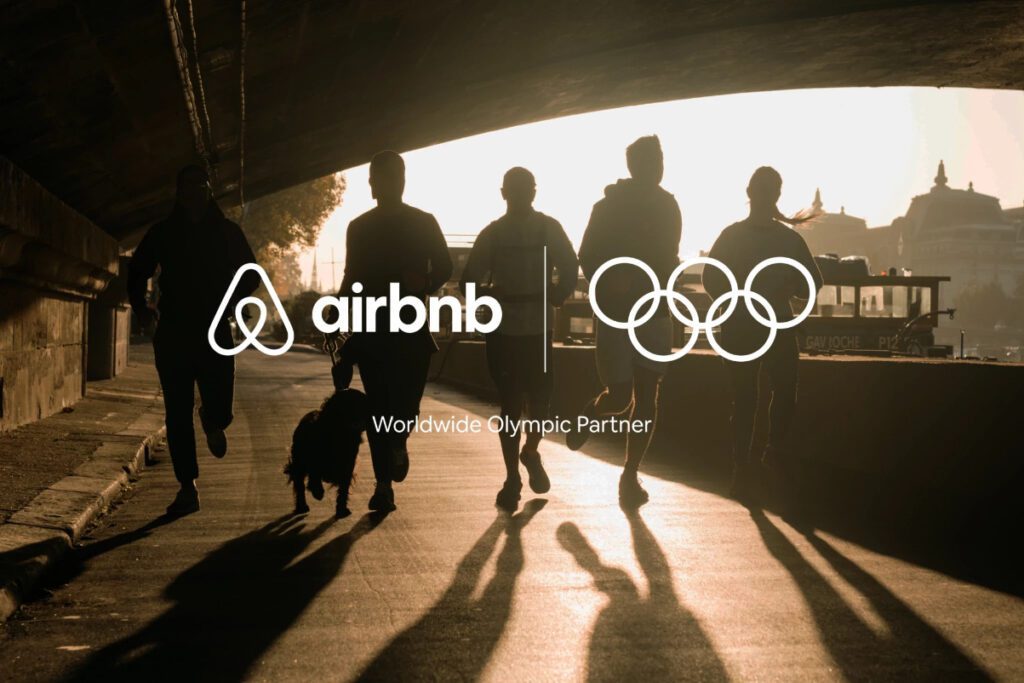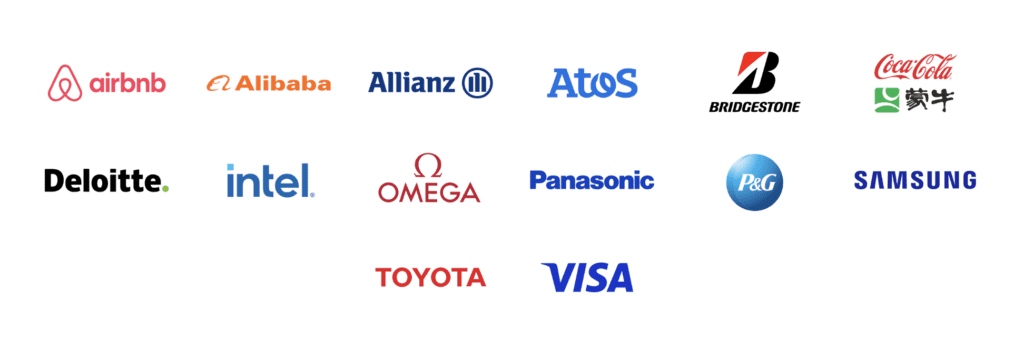Paris 2024, a global sporting event of unparalleled scale, also serves as a unique opportunity for brands to redefine their Olympic marketing strategies. As the world eagerly anticipates this monumental occasion, companies are poised to make a lasting impression through innovative Olympic marketing strategies.
This article will explore how brands leverage the upcoming Olympics to create impactful marketing campaigns.
While the stakes are higher than ever, with digital strategies providing new avenues for engagement and storytelling, brands face challenges in Olympic marketing. They compete for visibility and vying to create meaningful connections with their audiences. This holistic approach to Olympic marketing, while setting new benchmarks, also requires brands to navigate potential pitfalls and redefine the paradigms of global sports marketing.

📸 : Official Poster Of The Paris 2024 Olympic Games
The Importance of Marketing During the Olympics
The Olympics offer a unique platform for brands to reach a global audience. With billions of viewers tuning in from around the world, the potential for brand exposure is enormous. Marketing during the Olympics allows companies to:
- Showcase their products and services to a diverse audience
- Align their brand with the values of excellence, unity, and perseverance
- Create memorable experiences that resonate with consumers long after the games have ended.
What sets the Olympics apart is the emotional investment of the audience in the stories of athletes and the spirit of competition. This emotional engagement creates an unparalleled opportunity for brands to create deeply resonating messages that connect and engage with their audience.
Furthermore, the global nature of the Olympics allows for cross-cultural marketing opportunities. Brands can tailor their messaging to resonate with diverse cultural backgrounds, enhancing their appeal and fostering a sense of global unity. This ability to connect on a universal level is a unique advantage that only an event like the Olympics can offer.
Aligning with Olympic Values
One key strategy brands use for Olympic marketing is aligning their message with the Olympics’ core values. These values include excellence, friendship, and respect. By incorporating these themes into their campaigns, brands can create a deeper emotional connection with their audience.
For example, a sportswear brand might focus on stories of athletes overcoming adversity to achieve greatness. This not only highlights the brand’s commitment to excellence but also resonates with viewers who are inspired by these stories. However, not aligning with these values could lead to a disconnect with the audience. Similarly, a technology company might showcase how its innovations are helping athletes train better and achieve their dreams, aligning its brand with the value of excellence. Failing to do so could result in a missed opportunity to connect with the audience on a deeper level.
Moreover, the theme of friendship can be a powerful narrative for brands. Campaigns that highlight the camaraderie among athletes from different nations can emphasise values of unity and global togetherness. Such campaigns can transcend commercial messaging and contribute to a brand’s reputation as a worldwide harmony and respect promoter.
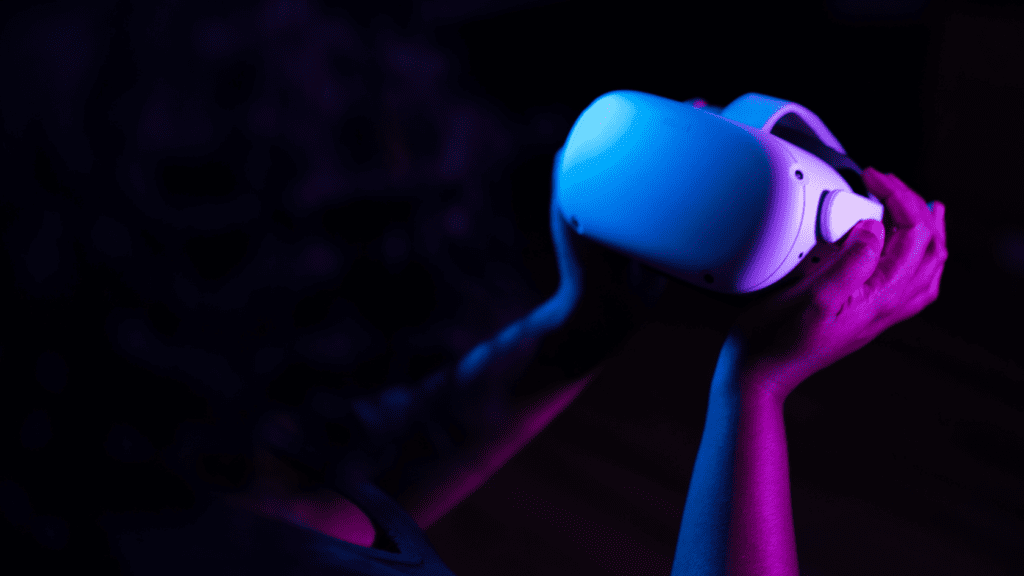
Leveraging Technology for Enhanced Engagement
In the digital age, technology plays a crucial role in marketing strategies. The Paris 2024 Olympics are no exception. Brands are utilising advanced technologies to create immersive and interactive experiences for their audience.
Augmented Reality (AR) and Virtual Reality (VR)
AR and VR technologies are being used to bring the Olympic experience closer to fans. Brands are creating virtual experiences that allow users to feel like they are part of the action. For instance, a brand might develop an AR app that lets users virtually participate in an Olympic event or explore the Olympic Village.
These technologies enhance user engagement and provide a platform for brands to showcase their technological prowess. By offering unique, immersive experiences, brands can differentiate themselves and create memorable interactions that leave a lasting impression.
Additionally, VR and AR can be used for educational purposes, helping audiences learn more about the history of the Olympics, the host city, or the athletes themselves. This added layer of value can deepen the audience’s connection to the event and the brand.
Social Media Campaigns
Social media platforms are powerful tools for engaging with audiences in real-time. Brands leverage these platforms to run interactive campaigns, share behind-the-scenes content, and engage with fans through live updates and stories. Hashtags like #Paris2024 and #OlympicDreams create a sense of community and excitement around the event.
The moon decided to play ball!
Four more nights until the #Paris2024 opening ceremony! pic.twitter.com/bIwllGc6Ag
— The Olympic Games (@Olympics) July 22, 2024
These platforms also allow for highly targeted advertising, enabling brands to reach specific demographics with tailored messages. Real-time analytics provide immediate feedback, allowing brands to tweak their strategies for maximum impact.
Social media enables user-generated content, where fans can share their experiences and stories about the Olympics. This creates a more dynamic and participatory campaign, fostering community and shared excitement.
Influencer Collaborations
One of the most effective strategies for Olympic marketing is collaborating with influencers and athletes. These partnerships have the power to significantly impact a brand’s reach and add authenticity to Their campaigns.
These partnerships help brands reach a wider audience and add authenticity to their campaigns. By working with well-known figures in the sports world, brands can create compelling content that resonates with fans.
Influencers bring their own following and credibility, making them valuable partners in amplifying a brand’s message. Their endorsement can lend authenticity and trust, essential qualities in the crowded digital landscape.
Additionally, influencer collaborations can extend beyond mere endorsements. Influencers can participate in creating content, co-hosting events, or even designing limited-edition products. This deeper level of involvement can make the collaborations more meaningful and impactful.
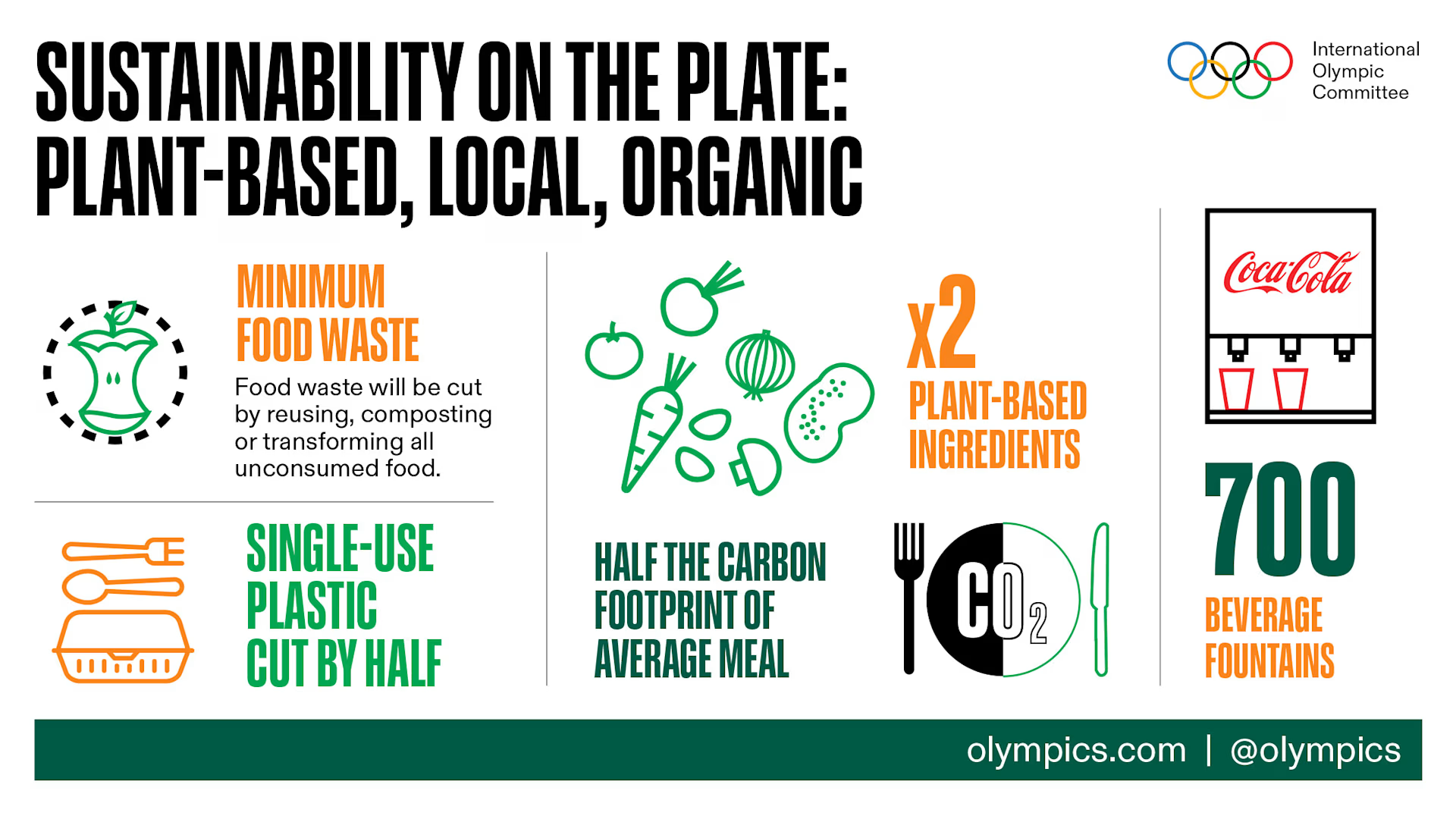
📸 : Paris 2024
Sustainability and Social Responsibility
As consumers become more conscious of environmental and social issues, brands must incorporate sustainability and social responsibility into their Olympic marketing strategies as well as look at ethical marketing strategies and best practices.
Eco-Friendly Initiatives
Many brands are launching eco-friendly initiatives as part of their Olympic campaigns. This includes using sustainable materials for merchandise, reducing carbon footprints, and promoting environmental awareness. By aligning with the Olympics’ commitment to sustainability, brands can appeal to environmentally conscious consumers.
These initiatives aim to meet consumer expectations and contribute to a more significant global effort to protect the environment. Brands that take a proactive stance on sustainability can differentiate themselves in the market and build long-term loyalty among eco-conscious consumers.
Furthermore, sustainability initiatives can be integrated into the brand narrative, highlighting the company’s long-term commitment to environmental responsibility. This can enhance the brand’s reputation and create a positive impact that extends beyond the duration of the Olympics.
Organisers aim to cut the carbon footprint of the Games by 50% compared to the average of London 2012 and Rio 2016, aligning with the Paris Agreement on Climate Change, while creating lasting social and economic benefits for the local population, which can be visible long before the Opening Ceremony.
Supporting Social Causes
Supporting social causes is another way brands are making an impact during the Olympics. Companies use their platform to raise awareness about important issues such as gender equality, diversity, and mental health. However, not supporting these causes could lead to a backlash from consumers who expect brands to stand for something they believe in. These efforts contribute to positive social change and enhance the brand’s reputation.
By aligning with social causes, brands can create campaigns that resonate more deeply emotionally. Consumers are more likely to support brands that stand for something they believe in, making social responsibility a powerful tool for building brand loyalty.
Moreover, partnerships with non-profit organisations and social enterprises can add credibility and impact to these initiatives. Such collaborations can amplify the reach and effectiveness of the campaigns, creating a win-win situation for both the brand and the cause it supports.
How Brands are Redefining Paris 2024 Olympic Marketing with Accessibility, Inclusion, and DE&I
As the Paris 2024 Olympics approach, leading brands are redefining their marketing strategies by focusing on accessibility, inclusion, diversity, equity, and inclusion (DE&I). These campaigns promote their products while emphasising the importance of making the Olympics a genuinely inclusive global event.
Emphasising Accessibility
Samsung has launched the “Open Always Wins” campaign, which aligns with the theme of inclusivity at the Paris Olympics. This campaign highlights the brand’s commitment to innovation and accessibility by showcasing how openness and technology can push boundaries. Samsung’s experiential activation, “Olympic Rendezvous,” offers interactive experiences that include accessibility features for people with disabilities, ensuring everyone can engage with the brand and the Games (Kimp) (Digital Agency Network).
P&G goes beyond traditional advertising by providing practical services for athletes in the Olympic Village, including accessible facilities such as a nursery for parents with young children, a laundry room, and dental care with Oral-B products. These services demonstrate P&G’s commitment to supporting athletes of all backgrounds and needs, making their Olympic experience more manageable and inclusive (Thryv).
Promoting Inclusion
Coca-Cola’s campaign, “It’s Magic When The World Comes Together,” focuses on the unifying power of the Olympics. The campaign underscores the importance of respect, love, and togetherness, resonating with diverse audiences worldwide. Coca-Cola’s messaging emphasises that while athletes may compete against each other, the true spirit of the Olympics lies in the connections and unity they foster.
Airbnb has introduced the “Host the World” campaign, which provides travel grants and housing credits to athletes, including those from underrepresented and developing nations. This initiative ensures that athletes who face financial barriers can participate fully in the Games. Additionally, Airbnb encourages local hosts to offer accessible accommodations, ensuring that all athletes, regardless of their physical abilities, have a comfortable place to stay.
Championing DE&I
Deloitte’s “The First Effect” campaign focuses on the lasting impact of first-time achievements at the Olympics, highlighting stories of athletes who broke barriers and made history. This campaign features diverse athletes, such as Nicola Adams, the first female Olympic boxing champion, and Sarah Attar, the first Saudi Arabian woman to compete in track and field. By celebrating these trailblazers, Deloitte underscores its commitment to diversity and the importance of representation in sports.
LVMH’s campaign, “The Rooftops,” features a diverse group of athletes, including swimmers, fencers, and wheelchair tennis champions, training on Parisian rooftops. This visual narrative not only showcases the athletes’ dedication but also highlights the inclusive nature of the Games. LVMH’s collaboration with various charities to provide access to youth sports further demonstrates its commitment to fostering diversity and inclusion at the grassroots level.
The Paris 2024 Olympics provide a global stage for brands to market their products and promote the values of accessibility, inclusion, and DE&I. By integrating these principles into their campaigns, brands like Samsung, P&G, Coca-Cola, Airbnb, Deloitte, and LVMH are setting new standards for Olympic marketing.
These efforts enhance their brand image and contribute to making the Olympics a more inclusive and accessible event for all.
Several other brands are also making significant strides in marketing campaigns for the Paris 2024 Olympics. Here are a few noteworthy examples:
Air France, as an official partner of the Paris 2024 Olympics, has launched a campaign to create a welcoming experience for visitors. This campaign includes visual elements and messaging emphasising French hospitality and pride, enhancing the overall Olympic experience from arrival to event participation.
Sephora’s “Beauty and Sport” Olympic marketing campaign leverages the Olympic Torch Relay route, offering pop-up stores and interactive experiences in major French cities. This campaign aims to engage with both athletes and spectators, providing makeovers for athletes and offering games and prizes to visitors.
Coca-Cola’s campaign for the Paris 2024 Olympics focuses on themes of unity and togetherness. The ad campaign emphasises the emotional connections and respect among global competitors, aligning with Coca-Cola’s longstanding tradition of promoting global harmony through its marketing efforts.
These campaigns demonstrate how brands can effectively utilise the global platform of the Olympics to promote their products and values while engaging with a diverse audience. Each brand’s unique approach highlights different aspects of the Olympic spirit, from inclusivity and innovation to hospitality and emotional connection.
Measuring the Success of Olympic Marketing Campaigns
Measuring the success of Olympic marketing campaigns is crucial for understanding their impact and making data-driven decisions for future strategies. Key performance indicators (KPIs) to consider include:
Brand Awareness
Tracking brand mentions, social media engagement, and website traffic can help measure the increase in brand awareness during the Olympics. These metrics provide insights into the reach and visibility of the campaign.
Consumer Engagement
Analysing metrics such as likes, shares, comments, and video views can provide insights into how well the campaign resonates with the audience. High levels of engagement indicate that the content is compelling and relevant to the target audience.
Sales and ROI
Monitoring sales data and calculating the return on investment (ROI) can help determine the campaign’s financial success. This involves comparing the campaign’s costs with the revenue generated to assess its profitability.
Sentiment Analysis
Conducting sentiment analysis on social media and other platforms can provide valuable feedback on how the audience perceives the campaign. This can help identify areas of improvement and enhance future marketing efforts.
By using these KPIs, brands can comprehensively understand their campaign’s performance. This data-driven approach allows for continuous optimisation and ensures marketing efforts align with business objectives.
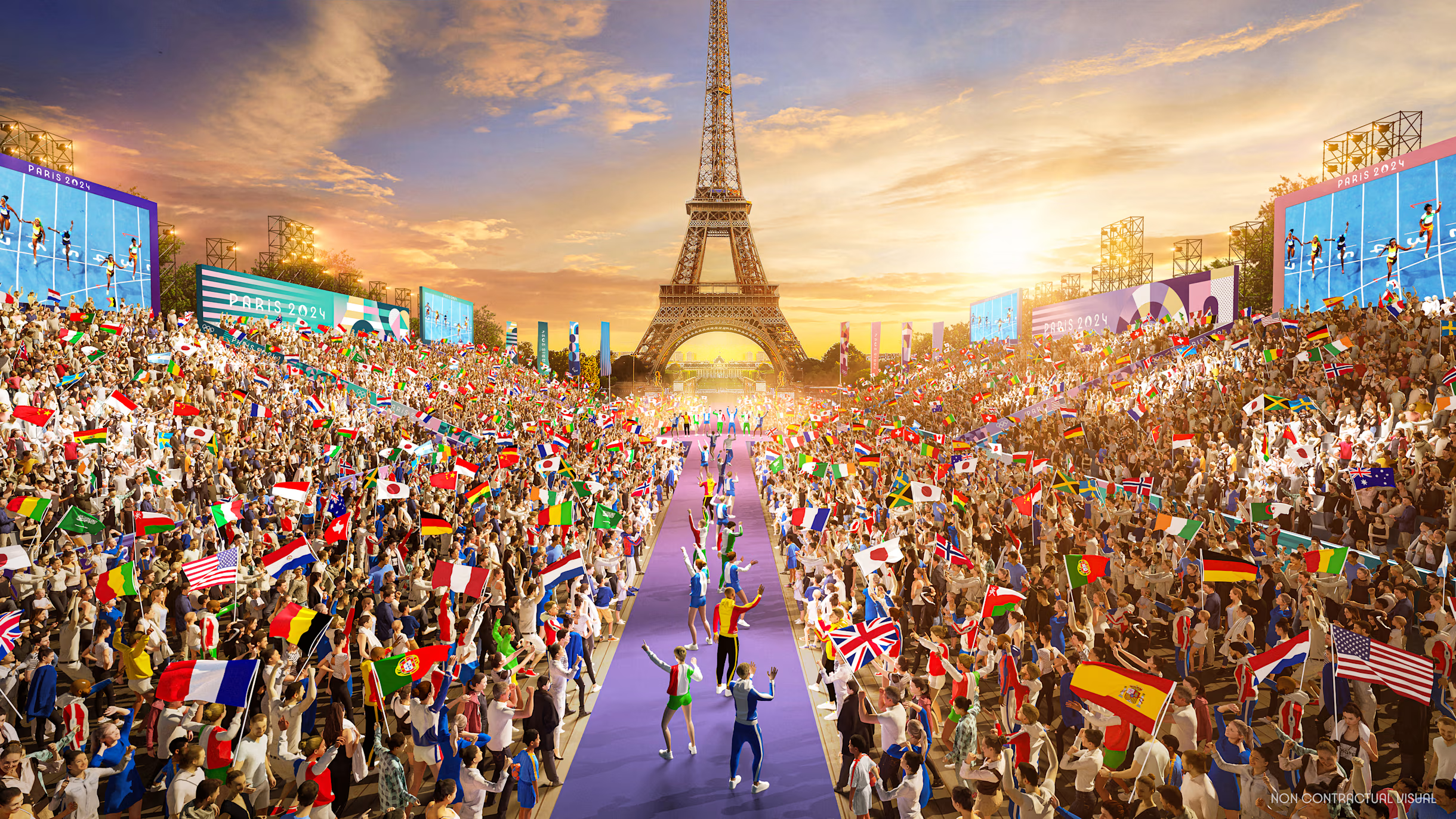
📸 : Paris 2024
Wrapped: How brands are redefining Paris 2024 Olympic marketing
Paris 2024 present a unique opportunity for brands to redefine their Olympic marketing strategies and create lasting impressions. By aligning with Olympic values, leveraging technology, embracing sustainability, and supporting social causes, brands can make impactful campaigns that resonate with a global audience.
As we look forward to the games, seeing how brands continue to innovate and inspire through their Olympic marketing efforts will be exciting.
The strategies discussed here are just the tip of the iceberg. As the event starts this week, we expect to see even more creative and groundbreaking campaigns.
The true winners will be those brands that connect with their audience emotionally, create memorable experiences, and contribute positively to society.
